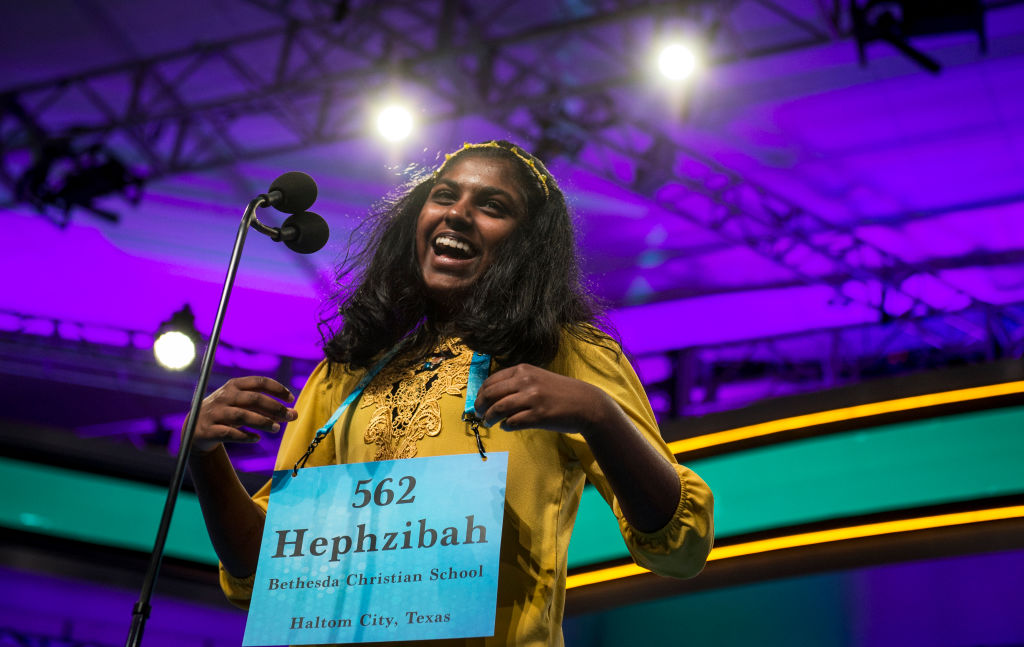
For some, it’s the biggest competition of the year. No, it’s not the NBA finals, or the Super Bowl: it’s the 92nd Scripps National Spelling Bee, which takes place this year in Washington, D.C. on May 29 and May 30, culminating in the finals tonight.
This year, 562 spellers competed for the big prizes of cash, glory and the knowledge of superior spelling capability. Each of the contestants was 15 years old or younger.
Although the competition has been around for over nine decades now, there was one notable change this year: even more contestants than ever. That’s due to a pay-to-play option called the “RSVBee.” First rolled out in 2018, the program enables spellers who have not won regional or state bees to apply for a shot in the national event, paying up to $1,500 for the opportunity. Scripps describes it as a “sincere effort to take a step toward fairness” by giving students in un-sponsored or more competitive areas a better chance to compete at the big event. To Shalini Shankar, professor of anthropology and Asian American studies at Northwestern University and author of an upcoming ethnography of bees, it’s also a new option that raises the level of the playing field and has “changed the tenor of the overall contest.”
“The scale of the event has really blown up in an incredible way,” Shankar explained to TIME by phone from Washington, where she had just stepped out of the daytime finals. She’s right: last year, there were 515 contestants, compared to this year’s 562. (Before RSVBee? Just 291 in 2017.)
In her seven years studying the bee, Shankar has noticed an incremental bump in difficulty each year, she said. That’s because families and spellers are spending more and more time and resources getting ready.
How about the old-school study standby: cramming? “That method no longer works,” she said. Preparation is a year-round activity, and dedicated spelling coaches even exist now, contributing to the growing “spelling bee industrial complex,” she explained.
“What spellers that I met in 2013 told me they did [to prepare] probably wouldn’t cut it today,” she said. Why the shift? When it comes to today’s contest, “everything in their lives has become a more intense competition,” even beyond that facing kids and adults just a decade older.
But at the end of the day, the Spelling Bee winners are often determined by luck: it just comes down to which word gets sent their way, Shankar said. (Some recent examples from the daytime finals: “Caerphilly,” a cheese, and “ferraiolone,” a type of cloak.) This year the finals are populated mostly by regional champions, not the RSVBee participants. The ultimate winner will get a $50,000 cash prize and engraved trophy, plus some reference works and dictionaries. The runner-up goes home with $25,000 and a trophy, while third place gets $15,000 and a medal.
And this year there’s one other change: the mic on stage. “They have a microphone that adjusts to the height of the speller,” Shankar notes — no small thing for kids whose heights can range widely. “It’s kind of hilarious.”
The 92nd Scripps National Spelling Bee finals air tonight on ESPN at 8:30 p.m. Eastern. Keep your dictionary handy.
More Must-Reads from TIME
- Donald Trump Is TIME's 2024 Person of the Year
- Why We Chose Trump as Person of the Year
- Is Intermittent Fasting Good or Bad for You?
- The 100 Must-Read Books of 2024
- The 20 Best Christmas TV Episodes
- Column: If Optimism Feels Ridiculous Now, Try Hope
- The Future of Climate Action Is Trade Policy
- Merle Bombardieri Is Helping People Make the Baby Decision
Write to Raisa Bruner at raisa.bruner@time.com